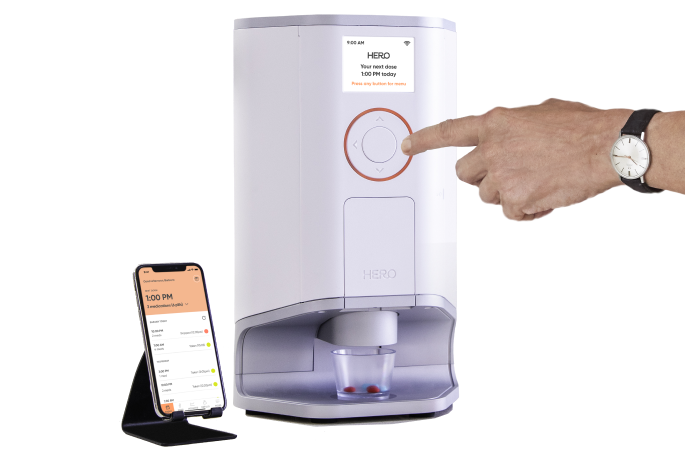A Caregiver's Guide to Doctor's Visits: Feel Prepared and Heard

Managing a loved one's healthcare can feel like a full-time job, and doctor's appointments, along with managing their medication, are often the most stressful part. You're trying to remember every symptom, every question, and advocate for the best care possible—all in a 15-minute time slot.
It’s a lot to handle, but you don't have to go in feeling overwhelmed. With a bit of planning, you can transform these visits into productive conversations. This guide offers a simple approach to help you feel prepared, ensuring both you and your loved one leave feeling heard and clear about what’s next.
A Little Prep Goes a Long Way
Doctor's visits are your chance to get clarity on your loved one’s health, ask important questions, and ensure their care plan is on the right track. Since appointments often feel rushed, walking in prepared helps you have a more focused and productive conversation.
Taking a few minutes to organize your thoughts beforehand can help you:
- Share all your important notes and questions.
- Prevent last-minute stress by having paperwork organized and ready.
- Partner with the doctor for more focused, effective care.
Your Pre-Appointment Checklist: 4 Steps to a Smoother Visit
Here are four key areas to focus on before the visit:
1. Observe and Note Their Current Health
In the days leading up to the visit, take a moment to observe your loved one’s health. Think about any changes—big or small—since you last saw the doctor. This information provides vital context.
- Have you noticed any new symptoms, or changes in mood or behavior?
- Are they having any trouble with mobility or daily tasks?
- How has their medication adherence been?
- Are they experiencing any new or worsening side effects from their medications?
2. Prepare a List of Questions
Appointments can feel rushed, so don’t rely on memory. Write down every question you have, putting the most important ones at the top of the list so they get addressed first.
- Is this medication still the best option for their condition?
- What specific side effects should we be watching for?
- Are there any alternative treatments or lifestyle changes we could consider?
3. Gather Essential Documents
Having everything in one place saves you from frantically searching through a bag or wallet.
- A current list of all medications, including dosages, over-the-counter drugs, and supplements. (If you're a Hero member, the app keeps a detailed log for you, making this step simple.)
- A log of any symptoms, side effects, or recent health events.
- Important records like recent test results or hospital discharge summaries.
4. Double-Check the Logistics
A smooth check-in process sets a calm tone for the visit. Before you leave, confirm you have:
- Updated insurance details and identification.
- Any required co-payments or referral documentation.
During the Visit: Making Your Voice Heard
Your preparation pays off once you’re in the room. Now you can focus on making the conversation as productive as possible, acting as a supportive partner for both your loved one and their doctor.
Be the Official Note-Taker
It’s easy to forget details once you leave the office. Bring a notebook or use your phone to capture the important takeaways so you can review them later.
- Write down any new medical terms to look up later.
- Record clear instructions for new tests or follow-up visits.
- Note any changes to their medication plan, including new prescriptions or dosage adjustments.
Be Their Voice (and Yours)
You know your loved one best, and your observations are valuable. Your role is to ensure their needs are heard, especially if they have trouble communicating or remembering everything.
- Ask for clarification. It’s always okay to say, "Could you explain that in a simpler way?"
- Fill in the gaps. Gently bring up symptoms or concerns your loved one might forget to mention.
- Confirm the plan. Before you leave, summarize the next steps by saying something like, “So just to be clear, we’ll schedule the blood test and watch for these specific side effects.”
Look at the Big Picture
If time allows, use the last few minutes to discuss long-term goals. This helps connect the current treatment plan to your loved one’s overall quality of life.
- You can ask about non-medical options like lifestyle changes or physical therapy.
- It might be a good time to discuss mobility aids or advanced care planning.
After the Appointment: Turning Plans into Action
The follow-through after the visit is just as important as the preparation before it. Taking a few moments to organize the outcomes ensures the doctor’s advice translates into meaningful care for your loved one.
Review Your Notes and Create a Plan
While the information is still fresh, go over your notes and create a clear to-do list. This helps you prioritize and ensures nothing falls through the cracks.
- Fill any new prescriptions and clarify the new medication schedule.
- Schedule any recommended tests or follow-up appointments.
- Talk through the visit with your loved one, giving them a chance to process the information and ask you questions in a calm setting.
Update the Care Routine
Once you have your to-do list, incorporate any new instructions into your loved one's daily plan.
- Adjust their schedule to accommodate new medications or therapies.
- Share important updates with other family members or professional caregivers to keep everyone informed.
- Track your loved one's progress, noting any side effects or health changes.
Navigating Common Challenges Together
Even with the best preparation, appointments can be challenging. Here’s how to handle a few common hurdles with confidence.
Always Involve Your Loved One
Whenever possible, include your loved one in the conversation and decision-making process. Asking for their input and respecting their autonomy is key to a true partnership in their care. This ensures they feel heard and valued, not just talked about.
When You're Running Out of Time
It's a common feeling in a short appointment. If the clock is ticking, stick to your prioritized list of questions to cover the most critical topics first. If you still have questions, ask the nurse or doctor about the best way to follow up—whether it's through a patient portal or a brief phone call.
When You Feel Emotionally Drained
Talking about health can be stressful for both of you. It's important to acknowledge this and take care of your own well-being. Give yourself a moment to breathe, and if possible, bring another family member along for moral support. Remember, your well-being matters, too.
When Coordinating with Multiple Doctors
If your loved one sees several specialists, keeping everyone aligned can feel like a job in itself. Maintain a central folder or digital record with all appointments and care plans. Always ask for visit summaries to be sent to their primary care doctor to ensure one person has the complete picture.
Peace of Mind for You, Consistent Care for Them
We've discussed how crucial an accurate medication list and adherence record are for a productive doctor's visit. Managing this on top of everything else is a major source of stress for caregivers. That’s precisely the burden Hero was designed to lift.
It’s a complete service designed to give you that peace of mind. Hero’s smart dispenser handles the sorting and tracking, removing the daily worry about missed or incorrect doses. It’s paired with a connected app, which means that instead of remembering complex schedules and keeping manual logs, you can simply pull up a detailed adherence report on your phone to share with the doctor. And for those moments when you or your loved one just have a question, there's always a real person available to help, 24/7.
You're Doing an Amazing Job
Being a caregiver is a role of immense love and dedication. By preparing for these visits, you empower yourself to be an effective advocate for your loved one. You're doing an amazing job, and it's okay to look for support that makes the journey a little smoother for both of you.
Complex med schedule? We solved it.
Hero’s smart dispenser reminds you to take your meds and dispenses the right dose, at the right time.

The contents of the above article are for informational and educational purposes only. The article is not intended to be a substitute for professional medical advice, diagnosis, or treatment. Always seek the advice of your physician or other qualified clinician with any questions you may have regarding a medical condition or its treatment and do not disregard professional medical advice or delay seeking it because of information published by us. Hero is indicated for medication dispensing for general use and not for patients with any specific disease or condition. Any reference to specific conditions are for informational purposes only and are not indications for use of the device.



